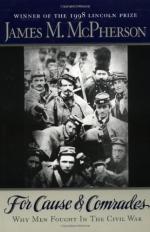|
This section contains 608 words (approx. 2 pages at 400 words per page) |

|
For Cause and Comrades: Why Men Fought in the Civil War Summary & Study Guide Description
For Cause and Comrades: Why Men Fought in the Civil War Summary & Study Guide includes comprehensive information and analysis to help you understand the book. This study guide contains the following sections:
This detailed literature summary also contains Topics for Discussion and a Free Quiz on For Cause and Comrades: Why Men Fought in the Civil War by James M. McPherson.
For Cause and Comrades is a quest by historian James McPherson to understand why the Civil War soldiers fought the Civil War and why they fought as intensely and for as long as they did. The Civil War is unusual not only in American history, but in world history as well for the unusual intensity and carnage of the war. Men were taking up arms against other men that they knew, and their country was relatively small. What explains this? McPherson read over 25,000 letters that Civil War soldiers wrote home in preparation for the book. These letters are his primary source of evidence.
McPherson argues that the initial impulse to fight the war was the simple "military rage" the follows early in the declaration of any war. Soldiers and citizens have to fire themselves up and get energized to fight and kill others. But in the Civil War, men were tearing down the doors in order to enlist, and they continued to enlist even after the initial excitement slowed down.
One important factor was that men fought because of their sense of manliness and courageousness. To fight was to have a chance to prove that one was a man and to prove the same to one's fellow community members. Fighting also resulted from a strong sense of duty to family, community, state, region and country. Ideology was a motivating factor as well; both sides believed that they were fighting for liberty, the Confederacy for the liberty of Southern whites who were threatened with rule by the North and the North for the liberty provided by the Constitution which they saw Southern secession as threatening.
In battle, men fought for various reasons, one of which was honor and being seen as courageous. Men's reputations were made and destroyed on the battlefield, where demonstrates of courage were the main method of telling good men from bad. Adrenalin was also a major motivator in combat, as soldiers on both sides were shocked at their ability to focus and fight for hours without stopping. But primary battle cohesion, in McPherson's opinion, was the most important factor.
Civil War soldiers were particularly poorly trained and complained constantly, so discipline and coercion were used to motivate soldiers as well; officers' most effective tool was public shaming. The inspiration provided by good leadership also played an important role, particularly when officers and combat leaders performed all the same tasks as their men. McPherson argues that religion was a huge factor, particularly because the second Great Awakening had just occurred, producing two of the most religious armies in human history. Religion caused men who thought themselves "saved" to be unafraid of death.
Patriotism was a major factor, but many men were motivated by the prospect of sacrificing for their country; they also believed themselves to be fighting for liberty. Union soldiers initially didn't care about slavery, but by the end of the war, many had come to believe that a good reason to fight was to end the oppression of blacks. Support from home and family kept soldiers going during hard time, although sometimes family members could undermine morale. Vengeance and hatred were undeniably huge factors in keeping men going, along with the mere fight for survival. Finally, victory and defeat on the battlefield correlated with the ebb and flow of high martial spirit.
McPherson concludes without settling on which of these factors were most important in motivating Civil War soldiers to fight, but the story he tells includes many important factors, which point the way towards a complete explanation, even if it does not explain which factors were the most important.
Read more from the Study Guide
|
This section contains 608 words (approx. 2 pages at 400 words per page) |

|



